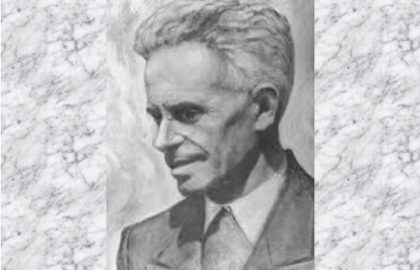Prof. Saimir Lolja: Father PJETËR MËSHKALLA S.J.

The reader can touch the first book dedicated to an Albanian Catholic priest’s life and deeds. The book saw publication after the collapse of communism in Albania in 1991. Fritz Radovani is passing on to readers his collections for an impressive and noble figure from the Albanian Catholic clergy. He was Father Pjetër Mëshkalla S.J. who carved on the stone: “The first name I have received on earth and which I have kept with honor is the name Albanian, and I will remain Albanian until my death”.
In the first part of the book, the author describes the friendly experience that he and his family had with Father Pjetër Mëshkalla. He recalls Father Pjetër Mëshkalla as an Albanian nationalist, a true Jesuit, authoritative in philosophy and theology, and a sharp voice for moral and human values. The author reveals him as a brave scholar with unbreakable character and a strong defender of free speech and justice.
The second part of the book contains poems and articles authored by Father Pjetër Mëshkalla and published in the press until 1945. For Father Pjetër Mëshkalla, the sonnet starts where the philosophy ends. For him, gratification is the triangle of goodwill, agreement, and cooperation, and advancement is itself a product of actions based on sound principles. He wrote that we could not say that we value and love our faith if we condemn the other beliefs because the faith touch is a matter of personal conscience.
Albanians of different religions are, first, Albanians. Therefore, we should be a brother to all, and peaceful coexistence is a reality.
The third part of the book exposes a summarized curriculum vita for Father Pjetër Mëshkalla. He was born on 25 September 1901 in Shkodra.
He received his early education in Shkodra and then went to Linz in Austria to study Theology. Until the age of 33, he continued his theology and literature studies in Slovenia, Poland, and Italy. He chose the path of Jesuit Order S.J. After he qualified as a priest, he returned to Albania and was assigned to teach in the Jesuits’ elementary school and later as a professor in their Seminar. Those who were acquainted with him recall his deep background, persistence in education, determination for improving his writings and poems, and his attention to Albania’s future and advancement.
He founded the youth assembly Shën Gjon Bosko in Shkodra in 1934. He relocated to Tirana in 1937 and initiated a similar body, Shën Pjetri. In 1938, he participated in the inauguration in Tirana of the Church of the Jesuits, “The Heart of Jesus”. In 1942, he openly expressed that partisans fighting under the direct leadership of Yugoslav and Albanian communists were soldiers of Tito and Stalin. Therefore, they were not going to bring freedom and democracy to postwar Albania. He was against any dictatorship. In addition to publications and speeches, Father Pjetër Mëshkalla and Father Gjergj Fishta told their students in 1940 not to salute in a fascist way.
The fourth, fifth, and sixth parts of the book divulge through publications and pieces of evidence the inflexible disposition of At Pjetër Mëshkalla in facing the communist regime both before his arrests and in prison. His first arrest by the communist regime came in 1946, and he remained in jail until the end of 1961. In April 1967, he was again arrested and sentenced to ten years in prison.
After Father Pjetër Mëshkalla got out of jail in 1977, he returned to Shkodra and stayed there until the end of his life on 28 July 1988. All citizens of Shkodra, of all faiths, expressed their farewell to him. The year 1967 was the year when anything religious became outlawed by the Albanian communist state. The freedom of speech and belief reappeared only in 1990, and Don Simon Jubani held the first Catholic mass on 11 November 1990 in Shkodra.
Father Pjetër Mëshkalla considered the Albanian Catholic Clergy as the most heroic clergy in Catholicism history. There were only 32 years (1912-1944) of opportunities to form the Albanian Clergy, yet that period produced more catholic martyrs and heroes than any other clergy in the world. He was always worried about having young people educated with a strong background and well-built character. He exerted so much energy in this direction that his ex-students even today are proud of having him as a teacher. The time proved his saying: “If people express their thoughts freely, this [communist] regime will fall soon”.
His intelligence was like a seal for his colleagues and friends, including the clerics of other beliefs. When he was in the prison of Burrel, his maxim was “Brother with all, independently of religious belief,” and his wisdom was definitive to all. His fellow sufferers in prison, independently of their spiritual beliefs, always helped him, and he helped them. The book ends with the official award “Beacon of Democracy” given to Father Pjetër Mëshkalla S.J. by the President of Albania in September 1992.
Book Review
by Saimir Lolja
Assoc-Prof, PhD, PEng
Canada, July 2011